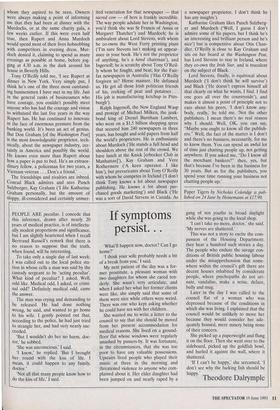If symptoms
persist. . .
PEOPLE ARE peculiar. I concede that this inference, drawn after nearly 20 years of medical practice, is of intellectu- ally modest proportions and significance, but I am slightly heartened when I recall Bertrand Russell's remark that there is no reason to suppose that the truth, when found, will be interesting.
To take only a single day of last week: I was called out to the local police sta- tion in whose cells a man was said by the custody sergeant to be 'acting peculiar'. What kind of peculiar? I asked. Well, odd like. Medical odd, I asked, or crimi- nal odd? Definitely medical odd, came the answer.
The man was crying and demanding to be released. He had done nothing wrong, he said, and wanted to go home to his wife. I gently pointed out that, according to the police, he had just tried to strangle her, and had very nearly suc- ceeded.
But I wouldn't do her no harm, doc- tor,' he sobbed.
`She was unconscious,' I said.
`I know,' he replied. 'But I brought her round with the kiss of life. I mean, it could happen to any family, doctor.'
`Not all that many people know how to do the kiss of life,' I said. `What'll happen now, doctor? Can I go home?'
`1 think your wife probably needs a bit of a break from you,' I said.
My next patient of the day was a for- mer prostitute, a pleasant woman with two daughters for whom she cared ten- derly. She wasn't very articulate, and when I asked her what her former clients were like, she simply said that some of them were nice while others were weird. There was one who kept asking whether he could have sex with her children.
She wanted me to write a letter to the council to say that she should be moved from her present accommodation for medical reasons. She lived on a ground- floor flat whose windows were regularly smashed by passers-by. It was fortunate, in the circumstances, that she was too poor to have any valuable possessions. Upstairs lived people who played their music at three in the morning and threatened violence to anyone who com- plained about it. Her elder daughter had been jumped on and nearly raped by a gang of ten youths in broad daylight while she was going to the local shop.
`I can't take no more, doctor,' she said. `My nerves are shattered.'
This was not a story to excite the com- passion of the Housing Department: they hear a hundred such stories a day. The people who endure the savage con- ditions of British public housing labour under the misapprehension that some- where within the council's gift there are decent houses inhabited by considerate people, where psychopaths do not uri- nate, vandalise, make a noise, deface, bully and mug.
Later in the day I was called to the council flat of a woman who was depressed because of the conditions in which she was living. I explained that the council would be unlikely to move her because they would consider her ade- quately housed, mere misery being none of their concern.
She picked up a paperweight and flung it on the floor. Then she went over to the sideboard, picked up the goldfish bowl, and hurled it against the wall, where it shattered.
`If I can't be happy,' she screamed, 'I don't see why the fucking fish should be happy.'
Theodore Dalrymple


















































 Previous page
Previous page